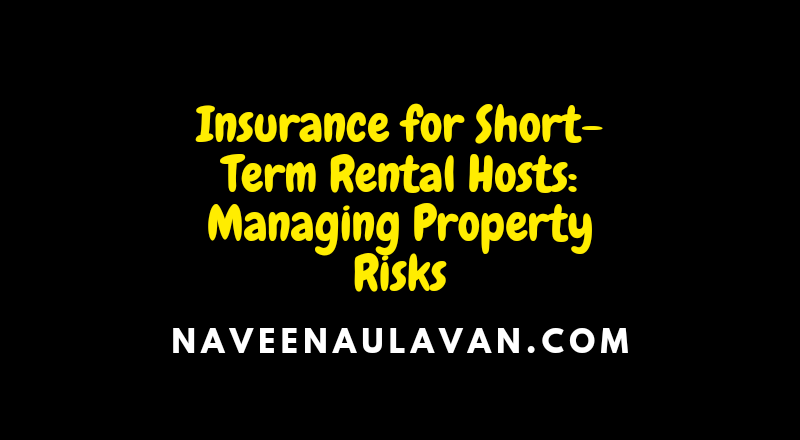The rise of short-term rental platforms like Airbnb and VRBO has provided homeowners with the opportunity to generate additional income from their properties. However, renting out your property on a short-term basis also comes with its fair share of risks. From property damage to liability claims, hosts can find themselves facing financial losses if proper insurance coverage is not in place. In this article, we will explore the importance of insurance for short-term rental hosts and provide insights on managing property risks effectively.
Understanding the Risks
Property Damage
When opening your home to short-term guests, there is always the risk of property damage. While most guests are respectful and take care of the property, accidents and mishaps can still occur. From broken furniture to stained carpets, the potential for damage is a reality that hosts must be prepared for.
Liability Claims
In addition to property damage, hosts can also face liability claims if a guest is injured during their stay. Slip and fall accidents, faulty appliances, or even neighborhood incidents can lead to legal action against the property owner. Without proper insurance coverage, hosts may find themselves liable for medical expenses, legal fees, and potential damages awarded in a lawsuit.
Theft and Vandalism
While most guests are trustworthy, there is always a risk of theft or vandalism. Hosts who rent out their entire homes while they are away can be particularly vulnerable to these risks. Valuable belongings and personal items can be stolen, and the cost of repairing any vandalism can be significant.
The Importance of Insurance
Protection for Your Property
Proper insurance coverage provides hosts with financial protection in the event of property damage. A comprehensive policy can help cover the costs of repairs or replacements, ensuring that hosts are not left with a hefty bill.
Liability Coverage
Insurance also offers liability coverage, protecting hosts against potential lawsuits stemming from guest injuries. This coverage often includes medical expenses, legal fees, and damages awarded in court. Without it, hosts could be at risk of losing their personal assets in the event of a lawsuit.
Peace of Mind
By having the right insurance coverage, hosts can have peace of mind knowing that they are financially protected against unforeseen events. This allows them to focus on providing a positive guest experience without constantly worrying about potential risks and liabilities.
Types of Insurance for Short-Term Rental Hosts
Homeowner’s Insurance
Most standard homeowner’s insurance policies do not provide coverage for short-term rentals. Hosts need to consult with their insurance provider and determine if they require additional coverage options or if they need to switch to a more suitable policy that takes short-term renting into account.
Specialty Short-Term Rental Insurance
Many insurance companies now offer specialty short-term rental insurance specifically tailored to the needs of hosts. These policies usually cover property damage, liability claims, theft, and vandalism. They can be more comprehensive than traditional homeowner’s insurance and provide specific coverage for short-term rental activities.
Secondary Insurance
In some cases, short-term rental platforms like Airbnb offer secondary insurance coverage to hosts. These policies usually cover specific incidents, such as guest injuries, but may have limitations or exclusions. It is important for hosts to review the terms and conditions of these secondary insurance policies and evaluate if additional coverage is needed.
Managing Property Risks
Vet Your Guests
One way to minimize risks is by carefully vetting your guests before accepting bookings. Short-term rental platforms often include guest verification procedures and allow hosts to review guest profiles and reviews. By selecting guests with positive reviews and a good reputation, hosts can reduce the likelihood of property damage or other incidents.
Set Clear House Rules
Establishing clear house rules is essential to protect your property and prevent any potential issues. Clearly communicate your expectations to guests regarding smoking, parties, and other that may pose a risk. This can help deter guests from engaging in behavior that may result in damage or liability.
Implement Security Measures
Installing security systems, such as cameras or alarms, can act as a deterrent to potential thieves or vandals. This added layer of protection can help minimize the risk of theft and vandalism, giving hosts peace of mind.
Keep Detailed Documentation
Hosts should maintain detailed documentation of their property’s condition before and after each guest stay. This includes photographs and descriptions of the property’s contents and condition. In the event of damage or theft, this documentation can be vital when filing an insurance claim.
Choose the Right Insurance Provider
When selecting an insurance provider for your short-term rental property, it is important to research and compare different options. Look for providers that specifically offer coverage for short-term rentals and have experience in the industry. Read reviews and testimonials from other hosts to ensure that the provider is reliable and responsive when it comes to handling claims.
Conclusion
Insurance is a crucial aspect of managing risks for short-term rental hosts. By understanding the potential risks, obtaining the right insurance coverage, and implementing risk management strategies, hosts can protect their property, finances, and peace of mind. It is essential for hosts to carefully assess their insurance needs, consult with insurance providers, and take proactive measures to mitigate risks. Being well-prepared and adequately insured will allow hosts to enjoy the benefits of short-term rentals without the constant worry of potential property risks.
